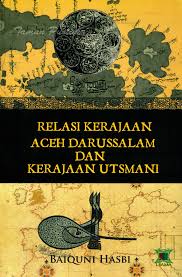Selected Publications
Since completing my Ph.D. in the Global History of Modern Muslim Societies, my research and publications have centered on tackling contemporary issues through a historical lens. Grounded in the expansive framework of Global History, my work highlights underrepresented Southeast Asian perspectives, offering fresh insights into the narratives that shape our understanding of the modern world.
Below are some selected publications that reflect this focus:
Al-Jami'ah: Journal of Islamic Studies
Vol. 63, 2025, Issue 1
Journal Article
Pasai and Constantinople
Hybrid Legitimacies and Multiple Identities in the 15th Century Muslim Societies
What if Pasai and Constantinople in the fifteenth century did not derive their authority from a single Islamic identity, but from a deliberate fusion of multiple traditions? The article argues that both the Sultanate of Pasai and the Ottoman Empire constructed hybrid forms of legitimacy by combining Islamic, Indic, indigenous, and Greco-Roman Christian repertoires at the same time. Through close readings of primary texts such as Hikayat Raja-Raja Pasai and Ottoman narratives on Mehmed II, the study shows that these Muslim polities were not peripheral offshoots of a Middle Eastern “center,” but dynamic creative hubs within a polycentric Islamicate world, where sovereignty emerged from cultural synthesis rather than religious exclusivism.
Bagaimana jika Pasai dan Konstantinopel pada abad ke-15 tidak pernah hidup dalam satu identitas Islam yang tunggal, melainkan membangun kekuasaan melalui perpaduan tradisi yang berlapis? Artikel ini berargumen bahwa baik Kesultanan Pasai di Sumatra maupun Kekaisaran Utsmani di Konstantinopel membangun legitimasi politik melalui strategi hibrid—menggabungkan tradisi Islam, Indic, lokal, serta Greko-Romawi Kristen secara bersamaan. Dengan menelaah teks-teks primer seperti Hikayat Raja-Raja Pasai dan narasi Ottoman tentang Mehmed II, tulisan ini menunjukkan bahwa kedua polities Muslim tersebut tidak berada di “pinggiran” dunia Islam, tetapi berperan sebagai pusat kreatif dalam dunia Islamicate yang polisentris, di mana otoritas lahir dari sintesis lintas tradisi, bukan dari identitas religius yang monolitik.

International Journal of Islamic Khazah
Vol. 15, 2025, Issue 1
Journal Article
Constructing a Universal Ruler
Sultan Mehmet II and Hybrid Legitimacies of the Ottoman Empire
What if Sultan Mehmed II was never meant to be remembered only as a heroic Islamic conqueror, but as a ruler who consciously fused multiple civilizational traditions to legitimize his power? The article argues that Mehmed II’s authority was deliberately constructed through a hybrid framework that combined Islamic, Byzantine, and Persian symbols of sovereignty, presenting him as a universal ruler rather than merely a Muslim victor. By examining Tursun Beg’s Tarih-i Ebü’l-Feth, it shows that Ottoman legitimacy emerged from cultural synthesis across traditions, challenging modern romanticized narratives that reduce his reign to a simple civilizational clash.
Bagaimana jika Sultan Mehmed II sebetulnya bukan sekadar penakluk Islam yang heroik, melainkan seorang penguasa yang secara sadar memadukan berbagai tradisi untuk membangun legitimasi kekuasaannya? Artikel ini berargumen bahwa otoritas Mehmed II dikonstruksi melalui kerangka hibrid yang menggabungkan simbol-simbol keislaman, Bizantium, dan Persia, sehingga ia tampil bukan hanya sebagai pahlawan Muslim, tetapi sebagai penguasa universal dalam dunia Islamicate yang lebih luas. Dengan menelaah Tarih-i Ebü’l-Feth karya Tursun Beg, tulisan ini menunjukkan bahwa legitimasi Ottoman lahir dari sintesis kultural lintas tradisi—bukan dari oposisi peradaban—dan karena itu menggugat narasi romantik modern yang menyederhanakan pemerintahannya semata-mata sebagai “kemenangan Islam atas Kristen.”
Indonesia and the Malay World
Vol. 52, 2024, Issue 53
Journal Article
Holy War and the International Order
Rethinking Acehnese perang sabil in the late 19th century
This article argues that the traditional view of perang sabil (holy war) as a natural Muslim response to the Dutch invasion of Aceh in the late 19th century overlooks the complex dynamics of international relations and the racialization of Muslims. While previous scholarship portrayed perang sabil as an immediate and inherent reaction to a Christian empire, recent research suggests that the Acehnese ulama officially declared perang sabil only in the 1880s, four years after the Dutch first invaded. The article contends that this delayed response reflects the evolving international order and the colonial violence of the Dutch, challenging the simplistic Muslim-versus-Christian binary in Aceh’s history.
Artikel ini berargumen bahwa pandangan tradisional tentang perang sabil sebagai respons alami Muslim terhadap invasi Belanda ke Aceh pada akhir abad ke-19 mengabaikan dinamika kompleks hubungan internasional dan rasialisasi terhadap Muslim. Sementara penelitian sebelumnya menggambarkan perang sabil sebagai reaksi langsung dan melekat terhadap kekaisaran Kristen, penelitian terbaru menunjukkan bahwa ulama Aceh secara resmi mendeklarasikan perang sabil baru pada tahun 1880-an, empat tahun setelah Belanda pertama kali menginvasi. Artikel ini berpendapat bahwa respons yang tertunda ini mencerminkan perkembangan tatanan internasional dan kekerasan kolonial Belanda, yang menantang pandangan biner Muslim versus Kristen dalam sejarah Aceh.

Journal of Contemporary Islam
and Muslim Societies
Vol. 8, 2024 Issue 1
Islam, empire, and ideology
Lord Stanley and the Intersection of Islam and Politics in 19th Century Europe
This article explores the political biography and thought of Lord Henry Stanley, a member of the British House of Lords, who converted to Islam in the mid-19th century. Through a global historical perspective, it draws on Stanley’s personal writings, historical records, and parliamentary debates to trace his journey and analyze his political thought. By placing Stanley at the center of the nineteenth-century international political context, Stanley’s biography and political thought challenge the dominant narrative that portrays European officers only as colonizers and imperialists. It also complicates the conventional narrative between Islam and the Christian West that is dominantly portrayed as antithetical. Henry Stanley consistently demonstrated the values of justice, which he believed were deeply rooted in the Islamic political system, amidst the increasing racialization of Muslims both in Britain and in an increasingly Eurocentric international community. While Stanley did not oppose British imperialism in Asia and Africa, he did oppose some British policies in India and the Straits of Malacca, which he felt were the result of Britain’s arrogant attitude towards non-European political orders.
Bahasa Indonesia
Artikel ini mengulas biografi politik dan pemikiran Lord Henry Stanley, seorang anggota House of Lords Inggris, yang memeluk agama Islam pada pertengahan abad ke-19. Dengan perspektif sejarah global, artikel ini mengacu pada tulisan pribadi Stanley, catatan sejarah, dan debat parlementer untuk menelusuri perjalanan hidupnya serta menganalisis pemikiran politiknya. Dengan menempatkan Stanley di pusat konteks politik internasional abad kesembilan belas, biografi dan pemikiran politik Stanley menantang narasi dominan yang hanya menggambarkan perwira Eropa sebagai penjajah dan imperialis. Artikel ini juga mengkomplikasi narasi konvensional antara Islam dan Kristen Barat yang sering kali digambarkan bertentangan. Henry Stanley secara konsisten menunjukkan nilai-nilai keadilan yang ia yakini sangat berakar pada sistem politik Islam, di tengah semakin kuatnya rasialisasi terhadap umat Muslim, baik di Inggris maupun di komunitas internasional yang semakin Eurocentric. Meskipun Stanley tidak menentang imperialisme Inggris di Asia dan Afrika, ia menentang beberapa kebijakan Inggris di India dan Selat Malaka, yang ia rasa merupakan hasil dari sikap arogan Inggris terhadap tatanan politik non-Eropa.

Book
Relasi Kerajaan Aceh Darussalam dan Kerajaan Utsmani
In this book, I aim to shed light on the historical relations between the Sultanate of Aceh Darussalam and the Ottoman Empire, two significant Islamic powers that maintained diplomatic, military, and cultural ties during the 16th and 17th centuries. Through extensive research into Ottoman archives, local Acehnese manuscripts, and other primary sources, I argue that these interactions were not merely symbolic but constituted a pragmatic alliance driven by mutual interests in resisting Portuguese. My work seeks to demonstrate how Aceh, as a rising maritime power, strategically leveraged its connection with the Ottomans to bolster its geopolitical standing in Southeast Asia. Furthermore, I explore how the Ottoman influence left lasting imprints on Aceh’s political, military, and cultural landscape. This study is my modest contribution to deepening our understanding of Aceh’s history while offering fresh perspectives on the broader dynamics of Islamic networks in the early modern world.
It is worth noting that I wrote this book a decade ago, and since then, new insights and additional sources have emerged. As such, I am currently working on a revised edition to incorporate these developments and ensure the narrative reflects the most up-to-date understanding of Aceh’s rich history.
Bahasa Indonesia:
Dalam buku ini, saya bertujuan untuk mengungkap hubungan sejarah antara Kesultanan Aceh Darussalam dan Kesultanan Utsmaniyah, dua kekuatan Islam yang signifikan, yang mempertahankan hubungan diplomatik, militer, dan budaya selama abad ke-16 dan ke-17. Melalui penelitian mendalam terhadap arsip-arsip Utsmaniyah, manuskrip lokal Aceh, serta sumber-sumber primer lainnya, saya berpendapat bahwa interaksi ini bukan sekadar simbolis tetapi merupakan aliansi pragmatis yang didorong oleh kepentingan bersama dalam menentang Portugis. Karya ini berupaya menunjukkan bagaimana Aceh, sebagai kekuatan maritim yang sedang berkembang, secara strategis memanfaatkan hubungannya dengan Utsmaniyah untuk memperkuat posisi geopolitiknya di Asia Tenggara. Selain itu, saya juga mengeksplorasi bagaimana pengaruh Utsmaniyah meninggalkan jejak yang mendalam pada lanskap politik, militer, dan budaya Aceh. Studi ini adalah kontribusi kecil saya untuk memperdalam pemahaman kita tentang sejarah Aceh, sekaligus menawarkan perspektif baru tentang dinamika jaringan Islam dalam dunia modern awal.
Perlu dicatat bahwa saya menulis buku ini satu dekade lalu, dan sejak saat itu, wawasan baru dan sumber tambahan telah muncul. Oleh karena itu, saya saat ini sedang bekerja pada edisi revisi untuk menggabungkan perkembangan ini dan memastikan narasi tersebut mencerminkan pemahaman terkini tentang sejarah Aceh yang kaya.